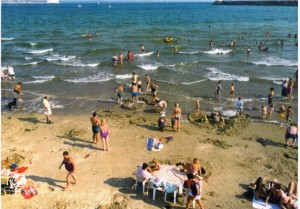Support us from £3/month
We deal with almost 1000 cases a year assisting communities, groups and individuals in protecting their local spaces and paths in all parts of England and Wales. Can you help us by joining as a member?
We are devastated that the supreme court has today rejected the rights of local people to register West Beach at Newhaven in East Sussex as a village green.
Five judges in the supreme court have upheld the appeal of Newhaven Port and Properties (NPP) Limited, overturning the decision in the court of appeal in March 2013 which said that the land could be registered as a village green. Local people have enjoyed Newhaven Beach for walking, fishing, swimming and other activities for generations.
We backed our member Newhaven Town Council in its court action to defend Newhaven Beach.
The supreme court considered three issues, whether (1) local people had enjoyed an implied licence to use the land, (2) by-laws had permitted use of the land, and (3) registration of the land as a village green was incompatible with the statutory function of the land which is held by NPP as a working harbour.
The court did not determine the first issue as it considered that it was not necessary to do so for the purpose of determining the appeal. On the by-law issue the court held that there existed a public-law right for local people to use the land for recreation and concluded that the public’s use was not ‘as of right’ (which is essential to register the land) but ‘by right’ because the use was permitted under the by-laws.
On the question of incompatibility the court confirmed that it is not possible to acquire rights by prescription (long usage) against a public authority which had acquired land for a specific statutory purpose.
The court found that the registration of the land as a village green would be incompatible with the use of the area as a working harbour.
Says Nicola Hodgson, our case officer: ‘This is devastating news for the local community and the town council who have fought so hard to retain this area for use by local people. The judgment appears to remove any previous ambiguity about the effect that existing by-laws will have on an application to register land as a village green and makes clear that where the land is held for a specific statutory purpose it will not be possible to register it as a green.’
It is not yet clear how many current applications for village greens will be affected by this judgment but there is no doubt that it makes it more difficult to register land as a green.
Adds Nicola: ‘This judgment comes on top of the pernicious change in English law, the Growth and Infrastructure Act 2013, which outlaws applications to register greens where land is threatened with development. With the courts and parliament working against us, the future of our precious open spaces is increasingly perilous,’ says Nicola.
The application to register the land as a village green was made by Newhaven Town Council to the registration authority, East Sussex County Council, in 2008. Following a public inquiry in 2010 the inspector, Miss Ruth Stockley recommended that the land should be registered as a village green. NPP then made an application to the high court and in November 2011 Ouseley J rejected all but one of its arguments. Newhaven Town Council appealed and the court of appeal reversed that decision in March 2013 and said that the land could be registered as a green. Now that decision has been reversed in the supreme court.
R (on the application of Newhaven Port and Properties Limited) (appellant) v East Sussex County Council and another (respondents) [2015] UKSC 7.
The full judgment is here.

